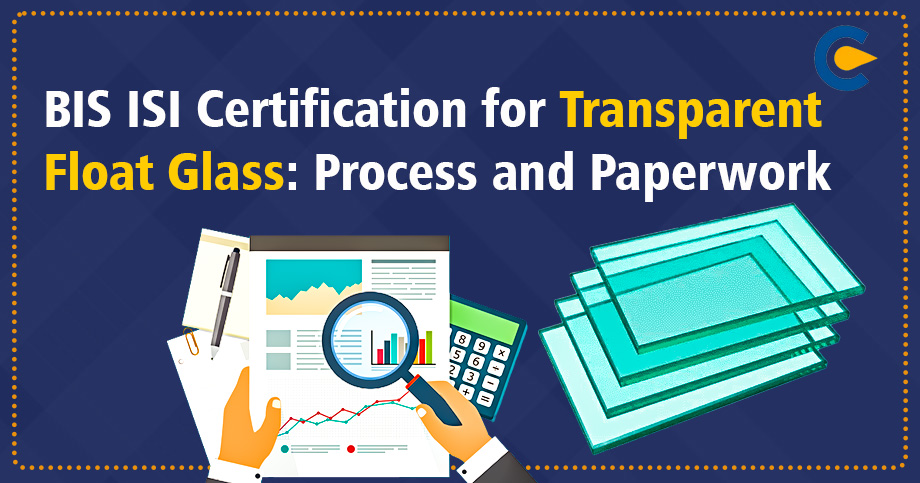Transparent float glass has become a high-priority material for the automobile and construction sector in India. The cost of production for transparent float glass is relatively lower than that of glass and sheet glass. Also, the optical clarity of the transparent float is on the higher side. The Indian Standard 14900:2000 has penned some mandatory standards concerning the manufacturing and overall quality of transparent float glass. Any non-compliance with these norms will lead to the seizure of the finished products. In view of this, all manufacturers must avail ISI mark from the Bureau of Indian Standards. In this write-up, you will learn everything about BIS ISI Certification for Transparent Float Glass in detail.
How is float glass manufactured?
Float glass is produced by permitting the glass from the tank furnace to stream across a molten tin bath in a present atmosphere of hydrogen and nitrogen, which renders a transparent glass sheet. This sophisticated manufacturing process allows float glass to embrace unprecedented clarity, making it a perfect material for automobiles.
Benefits of Securing BIS ISI Certification for Transparent Float Glass
The followings are the potential benefits of registering products under the ISI marking scheme:
- Increased exposure to the international market
- Improved credibility and goodwill in the given marketplace
- The influx of new customers
- The increased growth rate of the business
- The chances of expanding the product range become brighter
- Increase trust among the potential customer base.
Mandatory Documentation concerning BIS ISI Certification for Transparent Float Glass
Some common documents required to apply for BIS ISI Certification for Transparent Float Glass include;
- Business certification
- Product quality certificate, if any
- Factory license
- Test report granted by a certified lab
- Detail concerning the manufacturing process
- List of Standards Followed
- Number of machines and furnace
- List of in-house testing equipment
How to secure BIS ISI Certification for Transparent Float Glass?
BIS ISI certification refers to a marking scheme that vouches for the quality of the product. ISI marking ensures that the given product is of utmost quality and has passed required tests under the standards. Here’s the detailed procedure of how to obtain BIS ISI Certification for Transparent Float Glass.
Step 1: Visit the BIS portal to fill e-application
The first step in this process is to file an e-form on the BIS portal[1]. For this, create a valid account on the portal by completing the verification process, which usually takes not more than a minute to complete. Select the apt form and fill in the required details such as firm name, applicable standard, address, owner details, product information, and so on. Once done, upload the mandatory document in the required file format.
Step 2: On-site vetting by BIS official
Post-e-filing, the authority will send its officials to the production facility to make some compliance checks. During an inspection, the officials will collect some samples from the finished lot for testing. The selected sample will be dispatched for testing to the certified lab. The onus of collecting of test report is on the applicant. The certified lab will perform the following test on the sample:
Step 3: Test report collection
The intimation regarding successful sample testing will be shared with the applicant via registered contact detail. Upon this, the applicant should collect the report and share the same with authority as soon as possible. The authority will vet the report in accordance with the underlying standards.
Note: The following tests will be performed by the BIS lab to measure the overall quality of the transparent float glass.
- Characteristic
- Dimension and tolerances
- Visual light transmission
- Visual faults
- Optical faults
- Bloom
Step 4: Grant of registration under the ISI marking scheme
Upon successful vetting of the submitted documents and test reports, the BIS will accord the registration to the application. The grant of certification will allow the applicant to use the ISI marking on their products.
Compliances are to be followed by manufacturers as per IS-14009:2000
- Glass thickness should be measured in accordance with Annexure A. Further, the manufacturer must refer to Annex B for measuring the width and length of the glass.
- The thickness tolerances should be in line with the standard. The same is true of the width and length tolerance on cut sizes.
- The manufacturer must use an anti-shock material and a wooden case to ensure the protective packaging of the float glass.
- Each float glass should reflect key information such as product name, manufacturing source, and glass thickness. The same rule applies to packages of float glass.
Conclusion
Transparent float glass renders several advantages over traditional glass. It has more strength and opaque clarity, making it an ideal material for vehicle manufacturers across India. The glass manufacturer cannot manufacture and sell transparent float glass without an ISI mark certification as per the BIS norms. Henceforth, it can be concluded that BIS ISI Certification for Transparent Float Glass serves as a fundamental legal license.
Read our Article:BIS CRS Certification for Visual Display Units – An Overview













